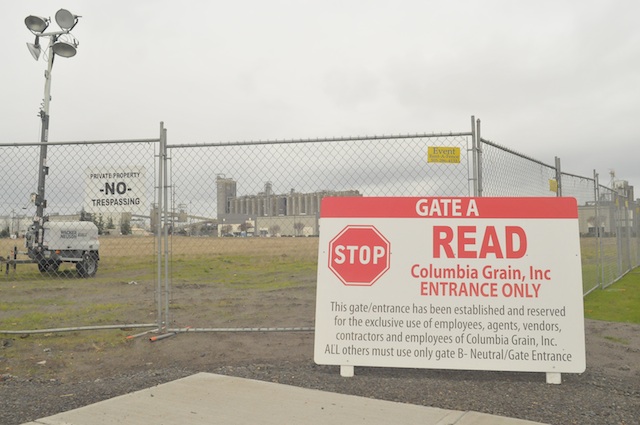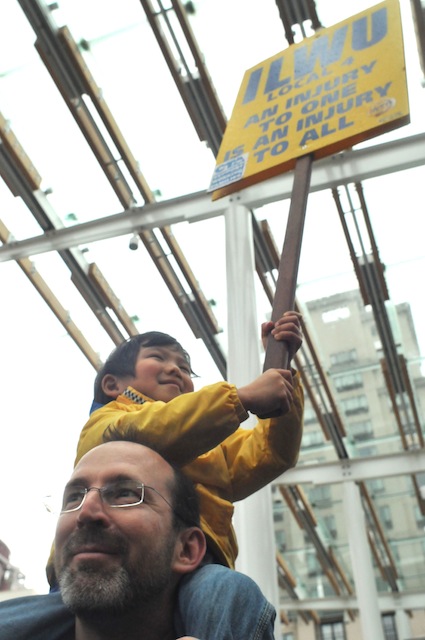
Fencing and warning signs have been put up around the publicly owned Port of Portland Terminal 5 in preparation for a possible labor conflict. Photo by Pete Shaw.
By Mark Vorpahl
Second of two parts
In the Northwest, at the terminals on the Columbia River, Puget Sound, and Portland, Oregon, the membership of the International Longshore and Warehouse Union (ILWU) are on the defensive against the Northwest Grain Handlers Association (NWGHA). The conflict involves nearly 3,000 workers at terminals that handle a quarter of the nation’s grain exports.
The NWGHA is demanding a long list of concessions that are in violation of the Pacific Maritime Association’s agreement that is supposed to cover West Coast Longshore workers. These include extending shifts to 12 hours without overtime pay and hiring fewer union members to unload ships.
Perhaps worse, over the course of the five-year contract, employers will be free to hire scabs and toss the contract if there are three job actions or if fines of $1,500 per hour are not paid within 15 days for a work stoppage. It was such collective direct action by Longshore workers that created the union. The NWGHA wants no more of it.
How can the NWGHA get away with such proposals? Unfortunately, precedent was recently established for these concessions at the port in Longview, Washington.
This had been the site of a long, bitter fight with the grain exporting multinationals grouped within the Export Grain Terminal (EGT) who claimed they were under no obligation to run the new terminal with ILWU members. For decades the ILWU has worked the West Coast docks. The EGT was attempting to break the ILWU’s strength.
ILWU Local 21 put up an inspiring militant fight that attracted wide support from the Longview community and other unions and activist groups up and down the coast, including large numbers from the Occupy movement. Busloads of supporters were ready to demonstrate their solidarity and confront a Coast Guard escorted scab ship.
However, the ILWU leadership felt forced to distance themselves from these efforts out of fear of anti-labor laws that could come down heavily on the union in the event of such a confrontation. They were under tremendous pressure to come to a tentative agreement before the possibility of such an event, while the EGT was determined to strike a blow against the union.
Eventually, union recognition at the Longview port was won before the scab ship arrived. However, the contract broke from the Pacific Maritime Association agreement and some members have characterized it as the worst ever. Now the grain companies are trying to enforce the Longview concessions at other ports as well.
Unfair Stand Off
In the current battle a strike and an employer lock-out have been averted for now. Unfortunately, the Longshore workers are on the job under the NWGHA’s “last, best, and final offer” that 94 percent of the union’s membership voted down.
The employers have not responded to the ILWU’s offers to continue to negotiate. At this point, the union leadership’s strategy hinges on getting a favorable ruling from the National Labor Relations Board (NLRB). They will file unfair labor practice charges accusing the terminal owners of bargaining in bad faith and forcing new terms on them before contract talks reached an impasse.
There are great dangers with relying on this approach. Even with the most well prepared case, trying to resolve such Labor conflicts through the NLRB is always a crapshoot. For instance, the ILWU has recently been stung by a number of NLRB decisions that went against them. In addition, the wheels at the NLRB turn notoriously slowly, which is both difficult to bear and dangerous for workers forced to labor under a sub-standard contract.
Labor law and its government bureaucracy were set up to contain workers’ struggles ultimately for the benefit of big business owners. While it is necessary for unionists to utilize it since this legal code does provide some limits on corporate abuse, they cannot depend on it. When this setup prevents workers from fighting to win, it is necessary to defy it however possible.
For instance, the NWGHA is currently paying for scabs to stand by and be prepared to take over operations permanently in the event of a strike. Under U.S. labor law this is legal. However, if mass pickets are organized to prevent the scabs from crossing the picket lines and getting to the work sites, the legal right of the employers to use scabs is moot. The courts will always try to limit the number of pickets with injunctions so that scabs can easily enter the workplace.
But, such court injunctions are not worth the paper they are printed on if there is enough worker/community support to turn out and build picket lines that can’t be crossed.
At the same time, it has been announced that there is a split in the NWGHA. Temco, a joint venture between agribusiness giants Cargill Inc. and CHS Inc., is continuing to employ Tacoma Longshore workers on terms of their last contract rather impose the voted down concessionary “last, best, and final offer.” Separate negotiations appear ready to get under way. If it were not for the ILWU’s ability to shut down the ports and the wide respect they have among working people in the Northwest, this would not have happened.
Challenging Anti-Worker Laws
An impending threat to a favorable resolution for the Longshore workers is the possibility of President Obama imposing a back-to-work order under the old contract in the case of a work stoppage. Such a measure would undercut the bargaining leverage of the union since the company’s profits would continue to roll in, if the workers chose to obey it.
President Bush issued such an order in 2002 when the Pacific Maritime Association (PMA) locked out ILWU Local 10 in San Francisco in a move that was intended to provoke federal interference. By bringing the membership back to work under these conditions, the PMA was free to use any anti-labor law in the books in an attempt to intimidate the union.
Such federal interference in labor disputes is allowed under the 1948 Taft-Harley Act, coined the “Slave Labor Act” by unionists at the time. This act outlawed many of the tactics the Congress of Industrial Organizations (a federation of industrial unions distinct from craft unions) successfully employed in the 1930s, such as solidarity or political strikes, secondary boycotts (industrial action by a union against a company on the grounds that it does business with another company engaged in a labor dispute), mass picketing and so on.
It also allowed states to pass “right to work laws” that outlawed closed union shops where all workers must join the union in order to maintain employment.
Taft-Hartley is only one of the most pernicious laws in a legal web meant to cripple workers’ collective efforts to improve their lives so that corporations can suck more profits out of them. The strike victory of the ILWU in LA and Long Beach managed to avoid these traps and shut down the docks. The ILA on the East Coast is negotiating with the threat of Taft-Hartley dangling over their heads. The Northwest ILWU Locals are being hit repeatedly with anti-labor laws that are tightly binding their ability to fight for a fair deal.
These laws must be defied when they prevent Labor from winning. However, the ability to do so cannot be done consistently by the ILA and the ILWU alone. These unions will have to reach out to other unions as well as to the community for support, explaining that the fate of their struggle will impact all working people. When a union negotiates a bad contract, other employers point to it as a way to convince their own workers to expect less. Conversely, when workers negotiate a good contract, other workers are inspired by their success and try to emulate it.
By reaching out to all working people, the Longshore unions can begin to create a movement that, if sufficiently massive, will have the power to defy court injunctions without suffering any penalties. Power will be in their hands.
Mark Vorpahl is a union steward, social justice activist and writer for Workers Action as well as Occupy.com. He can be reached at Portland@workerscompass.org.







